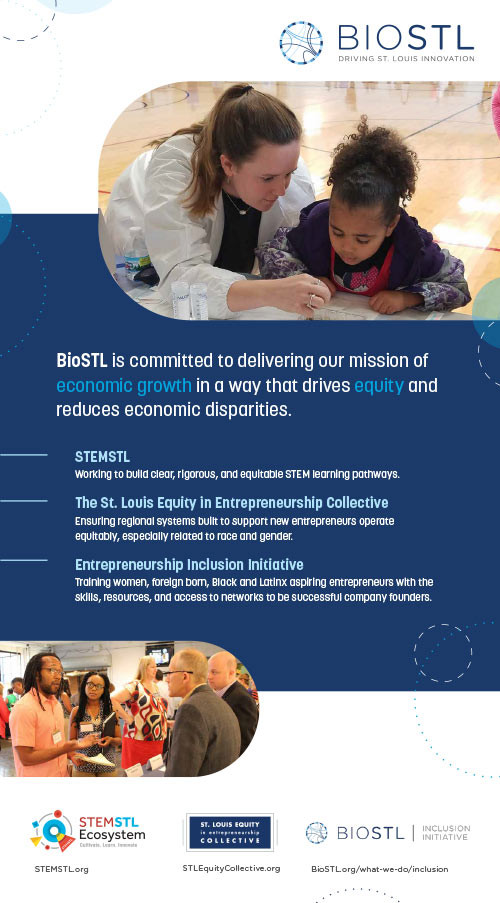





By: Lindsey Harrison, Ben Johnson, Natalie Self, and LaShana Lewis
Recent events, including the tragic killing of George Floyd, Breonna Taylor, Ahmaud Arbery, and more, underscore the ever-present reality that racist systems persist in our country and in our local communities. These same systems are at the root of racial disparities in health, education, and economic outcomes exacerbated by the coronavirus pandemic.
At the same time, St. Louis leaders and neighbors are participating in numerous economic development planning conversations throughout the region. BioSTL’s contribution to improving the St. Louis region is by driving innovation and entrepreneurship in the biosciences. For nearly 20 years, BioSTL has laid the foundation for St. Louis' innovation economy by introducing nationally-acclaimed initiatives in startup creation and investment (BioGenerator), strategic business attraction (GlobalSTL), physical environment (including the Cortex Innovation District and BioGenerator Labs), entrepreneur support (BioSTL Fundamentals), venture capital, a diverse and inclusive workforce, and public policy areas.
Our work has evolved over time, and we want to offer for consideration our learnings about how to deliver our mission of economic growth in a way that promotes equity, and reduces economic disparities. BioSTL started collaborative dialogue about diversity in the life sciences in 2008 and launched specific programing in 2014 with the launch of our entrepreneurship Inclusion Initiative training efforts to equip women, foreign born, and Black, Indigenous, and People of Color (BIPOC) aspiring entrepreneurs with the skills, resources and access to networks to be successful company founders. Since then, we have engaged more than 1,500 underrepresented, aspiring entrepreneurs.
Through six years of inclusion programming, we understand that positive intentions, collaborative dialogue, and individual programs are not enough, and we need to address our own biases. BioSTL has committed to a strategy that engages our leadership to further build an inclusive culture, moving toward an intentionally anti-racist organization supporting BIPOC. Building on past work that has shown to significantly increase the rates of company growth, BioSTL has committed resources to partner with BIPOC leaders and mentors in the St. Louis community to support underrepresented talent and develop a training program to help BIPOC entrepreneurs mitigate implicit bias in entrepreneurship. BioSTL also is sharpening its data tools and strategies to help analyze diversity, equity and inclusion outcomes and impact, not just activities, in building toward economic equity within our organization and in St. Louis.
We know that intentional, direct support and engagement with BIPOC innovators and entrepreneurs is necessary, yet insufficient without systems-level change. BIPOC entrepreneurs in bioscience are uncommon as a result of a multiplicity of inequitable systems that they must succeed through to make it to a place where entrepreneurship even feels like an option. Consider that in the St. Louis region, white sixth-graders are nearly three times as likely as Black sixth-graders to score proficient or advanced on state math tests, demonstrating an early systemic barrier to BIPOC residents having a shot at a STEM (Science Technology Engineering and Math) innovation career down the road. Later in schooling, white residents are 31% more likely to be enrolled in college than Black residents, and are twice as likely to graduate from St. Louis-area colleges within six years, compared to Black students.
We can’t program our way out of systemic barriers. Doing so is inefficient at best, and at worse, places a burden on the backs of BIPOC residents to out-perform a system that does not work for them.
Understanding this, BioSTL has committed additional efforts to fixing the systems that keep many BIPOC St. Louisans from accessing our STEM-based economy:
• STEMSTL is a collaboration of more than 60 schools, STEM institutions, community groups and youth-serving organizations working together to build clear, rigorous, and equitable STEM learning pathways. STEMSTL is launching a community of practice for out-of-school STEM programs to increase their quality. Core to its definition of quality is a commitment to anti-racist STEM learning.
• The St. Louis Equity in Entrepreneurship Collective (STLEEC) is a first-of-its-kind, intentional effort of regional entrepreneur support organizations, investors, funders, and company founders working to ensure that systems built to support new entrepreneurs operate equitably, especially related to race and gender. STLEEC, a winner of the Kauffman Inclusion Challenge, centers on four action committees focused on: access to resources, measuring and sharing data, diversifying networks, and ecosystem navigation. STLEEC is working on an audit tool for the entrepreneurship ecosystem to ensure Entrepreneur Support Organizations and Investors are being actively anti-racist and anti-sexist in their practices with the goal being that an entrepreneur’s success will not be pre-determined by their race or gender in the St. Louis region.
• BioSTL is partnering with Harris-Stowe State University, St. Louis’ only histoically Black college or university, to develop a new Center for Innovation and Entrepreneurship on campus, weave an entrepreneurial mindset into curriculums, and graduate more students with STEM degrees into the workforce.
We do all this work with an increased clarity that nothing is neutral, that it is easy to conflate “equity” work with inclusion work, and that if we are going to reduce equity gaps, we need to name the specific policies that are harming BIPOC bioscience learners and entrepreneurs, and target resources to remove those barriers. This region will not advance without both a comprehensive and anti-racist approach to economic development.
This region will not advance without both a comprehensive and anti-racist approach to economic development.
